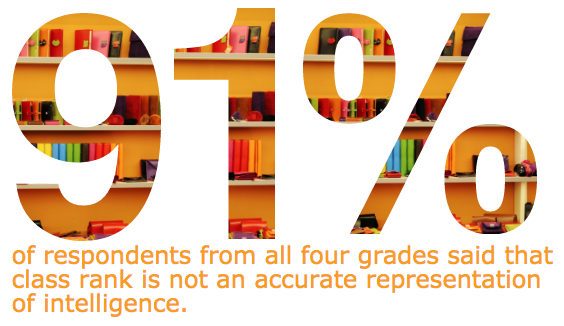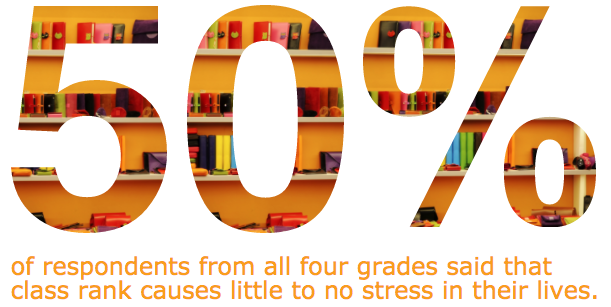Class rank prompts debate
Class rank has been found to cause students stress, and often sparks conversations about whether to abolish it.
February 17, 2017
Discussion regarding the value of class rank is rising amongst the Guidance Department and the Student Advisory Committee (SAC) based on sentiment that the ranking system incites more stress than it is worth.
With the current rank system, junior and senior students are given access to their class rank. Ordered from highest GPA downwards, the rank system organizes all students based on their GPA in comparison to other students. Class levels are weighted; an A in an honors level course will be worth more than an A in a college prep course on the GPA scale of 5.5. Class rank along with GPA, transcripts, and other academic data is submitted with college applications.
In a survey distributed by The Harbinger to randomly selected English classes on January 20, 91 percent of 206 respondents answered that they do not think class rank is an accurate representation of intelligence.
The Guidance Department administered a survey in the spring of 2016 to see what students thought about class rank. Currently, they are studying the results and considering their next steps. According to Director of Guidance Lisa Connery, the goal of their efforts is to break the stigma that rank determines worth.
“Kids aren’t pursuing their interests because of rank,” Connery said. “Our hope is to one, reduce stress around rank and admissions and to two, get students to pursue their interests more.”
 Graphic Carey Davis
Graphic Carey Davis
Working separately from the Guidance Department, SAC to the Regional School Committee has also expressed interest in altering class rank policy. The two groups plan to be in touch moving forward with policy about rank.
“We’re trying to introduce new policies to alter the system of class rank,” junior and SAC member Jessie Yin said. “We’re trying to put less emphasis on it because it’s a really big part of student stress. At the core everything is about eliminating stress.”
Principal Tom Mead works regularly with the SAC and serves as a bridge between Guidance and the SAC.
Mead noted that rank isn’t always an accurate way to show the brightest members of the school.
Traditionally, the valedictorian or salutatorian have been the highest lauded members of a class and are granted a speech at graduation. However, in recent years, Mead has instituted a “class essay” competition for graduation speeches to shift from the emphasis on ranking. This ensures the class speaker at graduation is speaking for the quality of their speech, not solely for how they were ranked throughout high school.
“At graduation, all these students have done exemplary things, and we tend to look at just two of them,” Mead said.
Competition to have a higher class rank has been acknowledged by administration, and has definitely not gone unnoticed by students.
“Our school is really competitive,” sophomore and SAC member Nellie Zhang said. “Everyone believes that your class rank will determine the college you get into. People think your class rank correlates with how smart you are, but it really doesn’t.”
Some colleges do currently look at class rank, but according to Connery there is a shift away from class rank being valuable in the application process.
With every college application, guidance counselors attach a school profile that is used to present a more holistic view of students than class rank does alone. The profile highlights various statistics, from test score averages to school graduation requirements, and helps show colleges a more detailed look at what students do and how they perform during their four years in high school.

At the Regional School Committee meeting on January 18, the guidance department delivered a presentation about their objectives, many of which related to student stress. The presentation emphasized the value of mindfulness, or keeping a well balanced mind in a time where stress seems to be overpowering.
“The presentation as a whole showed our role as a department and what we do with all the students,” Guidance Counselor Jason Lessard said. “Based on the Metrowest surveys and based on what we see everyday, we do see a lot of students who are stressed. From that, we started developing curriculum [regarding stress relief].”
Though the concept of class rank was designed in good nature to showcase student achievement, the rank system has evolved to bring out more competitiveness in students than humility regarding scholarly achievement.
“Rank is just another way for students to see their self worth and intelligence in a bad way, by boiling it down to one number,” Yin said.






















